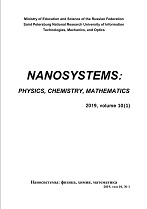|
PHYSICS
A comparative analysis of the observed effects of 2d tunneling bifurcations for quasi-one-dimensional and quasi-two-dimensional au-qd systems in an external electric field
M. B. Semenova, V. D. Krevchika, O. N. Gorshkovb, D. O. Filatovb, Y. Dakhnovskyc, A.V. Nikolaevd, A. P. Shkurinovd, V. Yu. Timoshenkod, P. V. Krevchika, A. K. Malike, Y. H. Wangf, T. R. Lif, Y. Zhug, S. Zhuangg, R. V. Zaitseva, I. S. Antonova, I. M. Semenova, A. K. Aringazinh, A. V. Shorokhovi, Y. H. Wangf
a Department of Physics, Penza State University, Penza 440026, Russia
b Department of Physics, Lobachevsky State University of Nizhny Novgorod,
Nizhny Novgorod 603950, Russia
c Department of Physics and Astronomy, University of Wyoming, WY 82071 Laramie, USA
d Moscow State University, Moscow 119991, Russia
e Department of Physics, Multanimal Modi College Modinagar, Uttar Prasesh 201204, India
f Institute of Functional and Environmental Materials, Lanzhou University, Lanzhou, China
g University of Shanghai for Science and Technology, Shanghai 200093, China
h Institute for Basic Research, Eurasian National University, Astana 010008, Kazakhstan
i Institute of Physics and Chemistry, National Research Mordovia State University, Saransk 430005, Russia
Abstract:
The effects of 2D tunneling bifurcations for quasi-one-dimensional and quasi-two-dimensional Au-quantum dot (QD) arrays in thin dielectric films in an external electric field have been studied theoretically and experimentally by Conductive Atomic Force Microscopy (CAFM). In the case of quasi-one-dimensional Au-QD structures (with the QD size $\sim$ 5 nm), in a dielectric film, a single break under positive bias polarity, corresponding to the effect of 2D tunneling bifurcation, previously predicted theoretically by our team [1], has been detected in experimental I-V curves of the CAFM probe-to-sample contact. A convincing qualitative agreement between the obtained experimental I-V curves and the theoretical field dependence for the 2D-dissipative tunneling probability in the model 2D-oscillator potential has been obtained for the case of parallel tunneling in the weak-dissipation limit at a finite temperature in an external electric field. In the case of quasi-two-dimensional structures with Au QD (with the QD sizes of 2 to 5 nm), possessing metamaterial properties, a pair of kinks corresponding to the double effect of 2D-tunneling bifurcations has been detected on the experimental I-V curves. A qualitative agreement between the experimental I-V curves and the theoretical field dependence for the 2D-dissipative tunneling probability has been obtained for a situation with an effectively “negative” permittivity of the heat bath.
Keywords:
quantum tunneling with dissipation, quantum dots, two-dimensional bifurcations.
Received: 27.10.2018
Citation:
M. B. Semenov, V. D. Krevchik, O. N. Gorshkov, D. O. Filatov, Y. Dakhnovsky, A.V. Nikolaev, A. P. Shkurinov, V. Yu. Timoshenko, P. V. Krevchik, A. K. Malik, Y. H. Wang, T. R. Li, Y. Zhu, S. Zhuang, R. V. Zaitsev, I. S. Antonov, I. M. Semenov, A. K. Aringazin, A. V. Shorokhov, Y. H. Wang, “A comparative analysis of the observed effects of 2d tunneling bifurcations for quasi-one-dimensional and quasi-two-dimensional au-qd systems in an external electric field”, Nanosystems: Physics, Chemistry, Mathematics, 9:6 (2018), 724–734
Linking options:
https://www.mathnet.ru/eng/nano362 https://www.mathnet.ru/eng/nano/v9/i6/p724
|

|



 Contact us:
Contact us: Terms of Use
Terms of Use
 Registration to the website
Registration to the website Logotypes
Logotypes